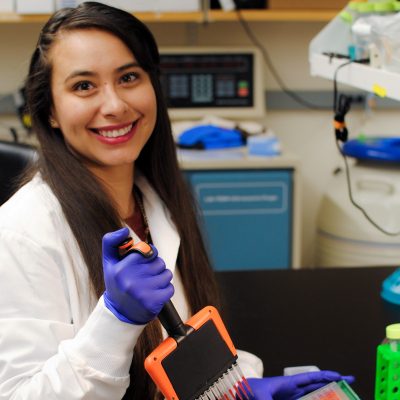Student Spotlight: Victoria Ortega

July 6, 2020
Victoria Ortega is a doctoral student in biomedical and biological sciences with a concentration in immunology and infectious disease from Thornton, California. After attending California State University, East Bay as an undergraduate and beginning her graduate studies at Washington State University, she transferred to Cornell to continue research with her advisor and discovered a welcoming community.
What is your area of research and why is it important?
My research focuses on studying the Nipah virus (NiV) infection mechanism. NiV is transmitted from fruit bats to humans and can lead to neurological and respiratory complications with an average 75% mortality rate. Specifically, I study the surface proteins of the virus involved in viral entry, the attachment (G) and fusion (F) glycoproteins. As G interacts with the host-cell receptor, it signals F to initiate viral entry. Evidence from my research emphasizes on a novel observation that G and F glycoproteins must continue to interact beyond the initial receptor-interaction step for successful viral entry.
What are the larger implications of this research?
The World Health Organization lists NiV as a top priority pathogen with high epidemic and bioweapon potential. NiV is of interest due to its human transmissibility, high case fatality rate, and lacking medical countermeasures. There are dozens of Nipah-like viruses that been discovered in recent years. Knowing the global impact that NiV can have, it is important to study the mechanisms of infection for if there is a large NiV outbreak, communities can be better prepared to handle it. Our approach provides a potential vaccine or drug development target to inhibit viral entry into host cells.
What inspired you to choose this field of study?
As an undergraduate student, I took a medical microbiology course and was amazed to learn how a virus made up of only a few genes can have such a complex impact on the human body. Since then, I have wanted to better understand pathogenic viruses and why they are successful at fooling our cells into getting hijacked and infected.
What does it mean to you to have received a Ford Fellowship?
I am honored to receive the Ford Foundation Dissertation Fellowship and grateful to my community consisting of family, mentors, and peers whose encouragement, feedback, and support made it possible. Receiving this fellowship means that I will be able to fully immerse myself in my writing and research during my dissertation year.
What will this fellowship allow you to do that you might not have otherwise?
The Ford Foundation Fellowship serves to increase the diversity of faculty in colleges and universities. This fellowship welcomes me to become a part of the tight knit “Ford Fellowship Family” that includes individuals from different areas of expertise and stages of their career who have the unifying goal of advancing diversity in education and society. I will also have an opportunity to attend Ford Conferences and gain invaluable networking opportunities with inspiring individuals.
What are your hobbies or interests outside of your research or scholarship?
I enjoy meeting new people and sharing my experiences as a first-generation URM graduate student through outreach activities as a Graduate Student Ambassador and as a peer mentor. I also have a few creative pursuits in the form of digital art, gardening, and designing/creating 3D printed materials at the mannUfactory makerspace facility on campus.
Why did you choose Cornell to pursue your degree?
I began my graduate studies at Washington State University and transferred to Cornell at the beginning of my third year to continue research with my advisor, Dr. Hector Aguilar-Carreño. During this transition, I discovered a welcoming and close-knit community Cornell exemplifies. I have had the wonderful opportunity to meet many people from diverse backgrounds and cultures through the different diversity, outreach, and professional development programs Cornell has to offer.
